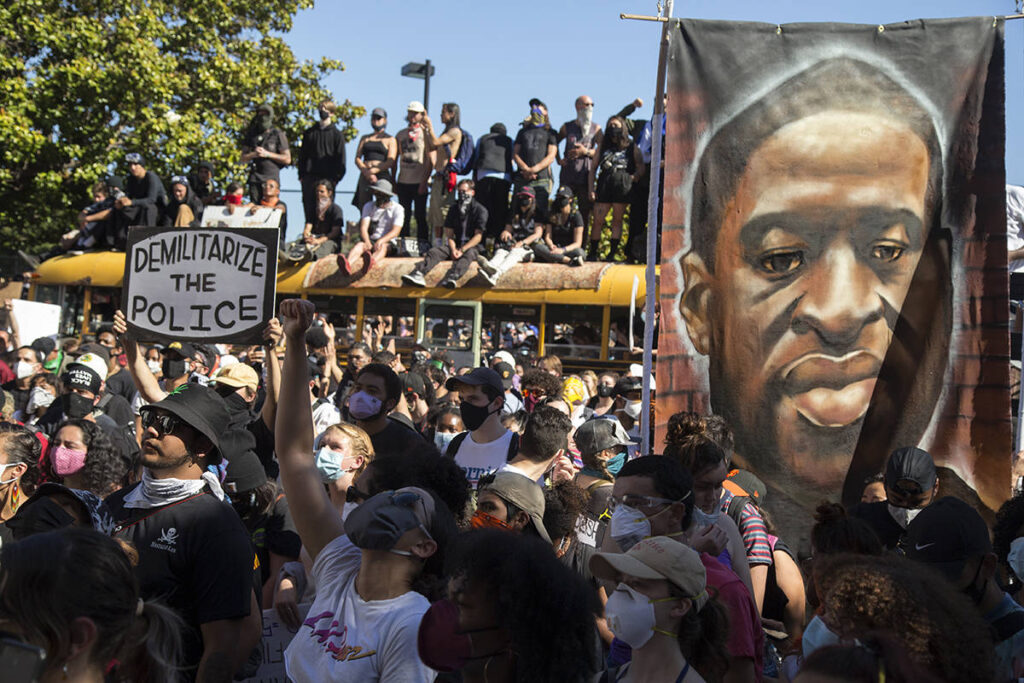Bipartisan police reform in reach on Floyd anniversary

Nearly one month ago, racial tensions threatened to tear apart an exceedingly rare and productive bipartisan relationship in Congress, a partnership making progress on one of the thorniest political issues of our time: police reform.
U.S. Sen. Tim Scott of South Carolina, the only black Republican in Congress, declared that “America is not a racist country,” although he added that it still has work to do on improving race relations and curbing police profiling and brutality.
The backlash from many corners of the black community against Scott, who made the statement in a televised rebuttal to President Joe Biden’s address to a joint session of Congress, was fierce. The term “Uncle Tim” went viral on Twitter for nearly 12 hours before the social media platform stopped allowing it to appear in its trending section. The Rev. Al Sharpton countered that the “practice of America was built on racism.”
Before that firestorm, Scott was reporting new progress on a reform bill after more than 10 months of stalemate. And the two-term senator praised the work of his Democratic partners, Sen. Cory Booker, a 2020 presidential primary candidate and former mayor of Newark, N.J., credited for decreasing crime and turning the city around, along with Rep. Karen Bass, a California Democrat and a prominent member of the Congressional Black Caucus.
Could the cross-party partnership survive the new wave of vitriol directed at Scott after his remarks countering the liberal argument of systemic racism?
Apparently so, because the same trio of lawmakers on Monday issued a joint statement citing renewed momentum in forging a compromise police-reform bill. Scott, Booker and Bass timed the statement to mark Tuesday’s one-year anniversary of the death of George Floyd, who was killed by former Minneapolis police officer Derek Chauvin, sparking months of protests, many of which became violent, in cities across the country.
“One year ago, George Floyd’s murder awakened millions of people around the world who had never before witnessed the deadly consequences of the failures in our policing system,” the lawmakers said. “…While we are still working through our differences on key issues, we continue to make progress toward a compromise and remain optimistic about the prospects of achieving that goal.”
If a bipartisan bill is truly within reach, its passage would take pressure off President Biden, who in his joint address promised to help push a measure over the finish line before the Floyd anniversary, only to back off that goal once it became clear Congress wouldn’t make the deadline.
The White House has since kept a lighter touch, arguing that it is allowing lawmakers the space to work through the issues, a position White House press secretary Jen Psaki repeated Monday.
“[Biden] is encouraged that there is ongoing progress and that there is a sense from negotiators that there’s a path forward, and he believes he can continue to press on that,” Psaki told reporters during her daily briefing.
Instead of a Rose Garden signing ceremony on a reform bill, Biden will host the Floyd family at the White House Tuesday for a private meeting.
Meanwhile, Bass, Booker and Scott are working through their differences. Chief among them is crafting a compromise on the issue that became the main roadblock to progress last year: whether to lift qualified immunity protection for police officers in civil lawsuits. Scott in early April told RealClearPolitics that he is willing to forge some middle ground, but more recently signaled he will not agree to total elimination of the legal protection.
The bipartisan trio reportedly has met in person three times over the last week in sessions that included the chairs of the Problem Solvers Caucus – Reps. Josh Gottheimer, a New Jersey Democrat, and Brian Fitzpatrick, a Pennsylvania Republican.
Last summer, Scott spearheaded a reform measure after an emotional speech on the Senate floor in which he talked about his own unsettling encounters with law enforcement, including one year in which police stopped him seven times. That effort broke down when Senate Democrats led a legislative filibuster to block the bill, with many of them stating that their top problem was that it didn’t include an overhaul of qualified immunity protections.
The bipartisan measure lawmakers are hashing out right now would overhaul several policing practices and modify qualified immunity, although they have yet to say exactly how. It would bar racial profiling at every level of law enforcement while trying to stop no-knock warrants and choke-holds by preventing police departments that don’t adhere to the standards from receiving federal aid.
The bill would also create a national police misconduct registry so that officers who are fired for such violations could not easily move on to another police department.
But the negotiations aren’t taking place in a vacuum. It could be difficult to win over the 10 Senate Republicans necessary for the bill’s passage, especially with new reports of skyrocketing crime in some big cities amid continued high levels of pandemic-produced unemployment. After seeing a 36% increase in murders, Los Angeles, for instance, is set to reverse its $150 million cuts to the department’s budget made last year amid calls from the left to “defund the police.” The infusion of cash will allow the police department to hire 250 more officers.
This article was originally posted on Bipartisan police reform in reach on Floyd anniversary







